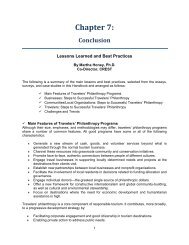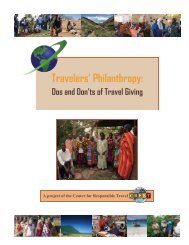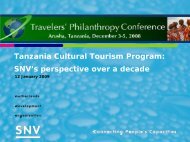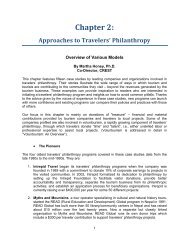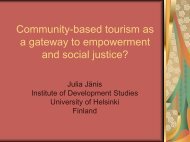Travelers' Philanthropy Handbook - Center for Responsible Travel
Travelers' Philanthropy Handbook - Center for Responsible Travel
Travelers' Philanthropy Handbook - Center for Responsible Travel
You also want an ePaper? Increase the reach of your titles
YUMPU automatically turns print PDFs into web optimized ePapers that Google loves.
<strong>Travel</strong>ers’ <strong>Philanthropy</strong> and the Good Samaritan 33By David (Jonah) Western, Ph.D.Founder and Chair, African Conservation Centre 34We all begin life as travelers. The question is, when we finish the trip of life do we leave thepeople and places we visited better off? This question is at the root of my interest in travelers’philanthropy. But what is travelers’ philanthropy? How can a traveler’s goodwill help the peopleand places visited?The overarching goal of traveler’s philanthropy is to improve lives and communities bysupporting social services, health, education, conservation, social justice and empowerment,climate change, tourism, business and enterprises. I would suggest that increasing equity andknowledge are also goals of travelers’ philanthropy, if they are not implied by empowerment.• Tourism, Ecotourism, and <strong>Travel</strong>ers’ <strong>Philanthropy</strong>To get a feel <strong>for</strong> the emergence of travelers’ philanthropy, I look at the origins of tourism itself,then to the development of ecotourism, and finally to how philanthropy can add value toecotourism and, perhaps, even to the tourism industry as a whole.Tourism is the single biggest transfer of wealthfrom North to South. It can be part of theresponse to Africa’s call <strong>for</strong> “trade not aid” fromthe developed world. Ecotourism is a small butsignificant part of the wealth transfer throughtourism. But, dollar <strong>for</strong> dollar, ecotourism doesfar more <strong>for</strong> people and nature than regularmass tourism. Yet both come down to fees paid<strong>for</strong> services rendered. The fee is the cost ofparticipating in the tourism activity and the waythe traveler pays <strong>for</strong> the amenity value received.The regular tourist may (or may not) hope thosefees do some good in the places he visits. Theecotourist insists they do.Community Wildlife Scouts, Kenya. Credit: David WesternIn the final analysis, though, tourism is still based on fees--and ecotourism on fees plus goodpractices. Lacking in both is the satisfaction that comes of making a personal contribution--andseeing people and nature benefit as a result. The personal contribution distinguishes travelers’philanthropy from ecotourism. But does that make travelers’ philanthropy trade-plus-aid? Ordoes travelers’ philanthropy also involve a personal conscience to ensure that charitable givingdoes good, not harm? The distinction is important if travelers’ philanthropy is to build on thepositive <strong>for</strong>ce of ecotourism and avoid the negatives associated with regular, mass markettourism. The challenge <strong>for</strong> travelers’ philanthropy is to marshal the raw potential of charity as apositive stimulus to community development and conservation.33 This paper is based upon the keynote address that Dr. Western gave at the 2008 <strong>Travel</strong>ers’ <strong>Philanthropy</strong> Conference.34 www.africanconservationfund.org.13




